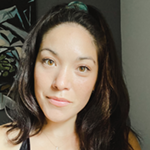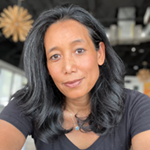Hapa: Half
CN: mentions of murder, violence, and racist speech
An Uber driver finds my eyes in the rearview and asks
Are you from my country
A dark-haired man, featureless in the dusk of the bar,
kneels like an old friend and says
You are one of my people
A guy on a city sidewalk shouts
ARE YOU CHINESE?
OR ARE YOU IRISH?
*
Strangers squint at me while we stand with our shopping carts between us
We went to high school together
Lindsey
from Milwaukee right
They turn toward me while we smell candles at an airport gift shop
You look just like her
Swear to god, exactly alike
I have learned to say: I have one of those faces
I have learned to smile and walk away.
*
The not-quite strangers, a friend’s roommate or a distant in-law,
ask me outright:
What kind of
Do you speak
How did your parents
She grew up in Hawaii, I explain,
Half-Japanese, I say, and the words are flimsy with overuse.
*
Are you… is it… your mom?
Sir. What the fuck, I do not say, because we are networking
My wife is from Japan, he announces,
and I feel a twinge of pity for her, or maybe me
She’s from a town near Nagoya, and we talk as if that’s relevant,
as if that’s somewhere I know.
*
A coworker finds a subreddit where mixed-race people talk about dads colonizing their moms’ bodies,
an idea that sticks in my throat like a half-swallowed pill
I find r/halfieselfies, which seems safer
until it isn’t
Herdaddy80: You’re a gorgeous mix! I’d say Korean and Mongol?
*
I know the urge to be categorized,
as if the answer could unlock something
For the first time in Census 2000, individuals were presented
with the option to self-identify with more than one race
Choose one, says the man processing my background check,
and I take too long, and he chooses for me
Choose one, I ask of anyone who will listen.
*
No white person would buy tatsoi in Chinatown at this hour,
but still, it is a relief when the cashier speaks to me in Cantonese.
*
Who am I without measuring my distance from whiteness?
Does standing next to my mom make me more Asian, by association,
or less Asian, in contrast?
*
Home is halfway between Japan and California,
an exceptional place where I am unexceptional
It is a paradise where white people are haole,
which means without breath
*
I had haole classmates for the first time, and I was intimidated,
my mom says about high school
Probably my bizarre confidence,
my dad says about his greatest strength
Maybe I am not a mix of my parents,
but the midpoint in the distance they had to cross.
*
At 18, I escape to a college where kids row crew,
where I become Asian for the first time
I savor it — the enraging flattery of a fetish
In that flickering moment, it feels like power.
*
This guy has a map of Japan taped beside his bunk bed, and he is nearly fluent because of anime,
and I don’t realize that this guy lives in every dorm, in every college, so I gasp when I see the katana.
*
In an alternate timeline, I grow up without Asian friends,
without fighting over who is the Yellow Ranger
In an alternate timeline, I grow up without Asian women,
without knowing they are the most beautiful women in the world.
*
It is not until I visit an onsen near Tokyo that I see my body’s sisters
Sturdy legs, delicate forearms,
half-handfuls of breasts, nipples more brown than pink
How had I not noticed?
We bathe with wooden buckets, crouched over plastic stools
We occupy every bench and pool,
and our bodies unfurl like fortunes.
*
Hey, China doll,
says a man in a button-down
and all I can think to say is
She’s Korean, you asshole
A thread comes loose,
and I keep pulling, and the man keeps laughing
When I’m with white women, we are assumed to be valuable.
*
Does it always start and end this way —
with the question of who sees us
and what they decide?
*
Women are murdered, grandmothers are beaten,
and what right do I have to be heartbroken?
But I am white–passing, says my half-Filipino friend,
and in that phrase is the question I can’t answer:
Is it still trauma if it doesn’t belong to us?
*
The world keeps moving, and we stay here,
on the side we chose long ago
How else would we become whole?

Lauren Scherr is a half-Japanese writer and left-handed Scorpio who lives and creates on the island of Oahu, Hawaii. Her writing is informed by turbulent feelings and a childhood spent dreaming of Jupiter’s red spot. Her nonfiction is published in SixbyEight Press and ANMLY, and you can sometimes find her on the portal: @laurenmariko on Instagram and @lauren_scherr on Twitter. Lauren also writes in collaboration with biologists, engineers, activists, founders, and other experts. Those articles have appeared in WIRED, Quartz, STAT, Fast Company, and elsewhere.

 BACK TO ISSUE
BACK TO ISSUE